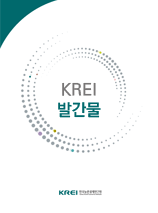- 10 Agricultural Policy Issues of Korea in 2019
-

-
The Korea Rural Economic Institute selected 10 agricultural policy issues of Korea in 2019 as follows, considering the basic frame that agricultural policy should pursue and the issues that need to be solved urgently and reflecting opinions of farmers, experts in agriculture and rural areas, and journalists.
① Reorganizing the direct payment program to strengthen the public role
• Reorganize the direct payment program to strengthen the public role of agriculture and rural areas, and not to be connected to production.
• A program is required for stabilized management of rice farmers if the variable direct payment program for rice is switched to a fixed direct payment program.
② Creating and increasing jobs in agriculture and rural areas
• Jobs in agriculture are expected to continue to increase.
• Build job ecosystem platforms in central-provincial-county units, and implement policies for creating participation-type jobs.
③ Creating smart farm innovation valleys and implementing a smart agricultural industry for innovative growth
• Create successful smart farm innovation valleys as innovative growth engines in the agricultural industry.
• Implement smart operation across the agri-food industry.
④ Increasing use of renewable energy through energy-independent villages in rural areas
• Promote energy-independent villages by organizing rural-type energy cooperatives operated by residents to achieve the goal of ‘Renewable Energy 3020’ of the central government.
⑤ Building regional circular food systems to promote the Food Plan
• Establish national food strategies for comprehensively planning the entire process of food production, processing, distribution and consumption, and build regional circular food systems.
⑥ Enhancing safety in production of agricultural and livestock products
• Develop a strategy for early settlement of PLS and minimized damage to farmers.
• Improve regulations for supplying safe livestock products, and consider the effect of strengthening regulations.
⑦ Improving the quality of rural life by expanding SOC for residents
• Although policies for improving farmers’ quality of life are enforced, the effect of improving living services in rural areas is limited.
• Strengthen policies for improving the quality of life in connection with expansion of SOC for residents in rural areas.
⑧ Building new agricultural policy governance with the establishment of the Special Committee for Agriculture, Fisheries and Rural Areas
• Ensure the representativeness of the committee and organize a capable executive office.
• Select agendas for creating outcomes through intensive discussion and establish strategies.
⑨ Preparing for resuming agricultural cooperation between South and North Korea with the progress of denuclearization talks
• Plan and implement programs for step-by-step inter-Korean agricultural cooperation to prepare for the progress of denuclearization talks among South and North Korea and the US, and the age of peace.
⑩ Responding to changes in the global trade environment
• The US will continue to lead changes in global trade order.
• Proactively respond to global trade environment changes centered around multilateral cooperation, e.g., CPTPP and RCEP. -
목차
요약문
The Korea Rural Economic Institute selected 10 agricultural policy issues of Korea in 2019 as follows, considering the basic frame that agricultural policy should pursue and the issues that need to be solved urgently and reflecting opinions of farmers, experts in agriculture and rural areas, and journalists.
① Reorganizing the direct payment program to strengthen the public role
• Reorganize the direct payment program to strengthen the public role of agriculture and rural areas, and not to be connected to production.
• A program is required for stabilized management of rice farmers if the variable direct payment program for rice is switched to a fixed direct payment program.
② Creating and increasing jobs in agriculture and rural areas
• Jobs in agriculture are expected to continue to increase.
• Build job ecosystem platforms in central-provincial-county units, and implement policies for creating participation-type jobs.
③ Creating smart farm innovation valleys and implementing a smart agricultural industry for innovative growth
• Create successful smart farm innovation valleys as innovative growth engines in the agricultural industry.
• Implement smart operation across the agri-food industry.
④ Increasing use of renewable energy through energy-independent villages in rural areas
• Promote energy-independent villages by organizing rural-type energy cooperatives operated by residents to achieve the goal of ‘Renewable Energy 3020’ of the central government.
⑤ Building regional circular food systems to promote the Food Plan
• Establish national food strategies for comprehensively planning the entire process of food production, processing, distribution and consumption, and build regional circular food systems.
⑥ Enhancing safety in production of agricultural and livestock products
• Develop a strategy for early settlement of PLS and minimized damage to farmers.
• Improve regulations for supplying safe livestock products, and consider the effect of strengthening regulations.
⑦ Improving the quality of rural life by expanding SOC for residents
• Although policies for improving farmers’ quality of life are enforced, the effect of improving living services in rural areas is limited.
• Strengthen policies for improving the quality of life in connection with expansion of SOC for residents in rural areas.
⑧ Building new agricultural policy governance with the establishment of the Special Committee for Agriculture, Fisheries and Rural Areas
• Ensure the representativeness of the committee and organize a capable executive office.
• Select agendas for creating outcomes through intensive discussion and establish strategies.
⑨ Preparing for resuming agricultural cooperation between South and North Korea with the progress of denuclearization talks
• Plan and implement programs for step-by-step inter-Korean agricultural cooperation to prepare for the progress of denuclearization talks among South and North Korea and the US, and the age of peace.
⑩ Responding to changes in the global trade environment
• The US will continue to lead changes in global trade order.
• Proactively respond to global trade environment changes centered around multilateral cooperation, e.g., CPTPP and RCEP.저자정보
저자에게 문의
구매안내
KREI의 출판물은 판매 대행사 (정부간행물판매센터)와 아래 서점에서 구입 하실 수 있습니다.
판매대행사
- (주)정부간행물판매센터http://www.gpcbooks.co.kr사이트 바로가기
- 서울특별시 중구태평로 1가 25번지
- TEL 02) 394-0337, 734-6818
- FAX 02) 394-0339
판매서점
판매서점 교보문고 http://www.kyobobook.co.kr/ 영풍문고 http://www.ypbooks.co.kr/ 알라딘 http://www.aladin.co.kr/ 활용도 정보
활용도 정보 상세정보 조회 좋아요 다운로드 스크랩 SNS공유 13660 0 196 0 0 -
- Suggestions to Promote the Hometown Love Donation System
- Gouk, Seungyong
- 2022.11.25
- KREI 이슈리포트
-
- Ten Years of Korea-U.S. FTA: focusing on agri-food trade
- Kim, Kyungphil
- 2022.06.09
- KREI 이슈리포트
-
- Impacts of Ukraine-Russia Conflict on Global Grain Prices
- Kim, Jongjin
- 2022.03.31
- KREI 이슈리포트
-
- The Impacts of the COVID-19 on the Korean Agricultural Market
- Seo, Hong-Seok
- 2020.06.05
- KREI 이슈리포트
-
- State of Korean and Overseas Markets for Environment-Friendly Agricultural Products and Challenges 2018
- Jeong, Hakkyun; Sung, Jaehoon; Lee, Hyeonjeong
- 2018.09.12
- KREI 이슈리포트
-
- Measures to Establish the Water-Energy-Food Nexus for Agricultural Resource Management
- Sung, Jaehoon; Cho, Wonju; Lee, Hyeonjeong
- 2018.09.05
- KREI 이슈리포트
-
- Changes in the Trade of Agricultural and Livestock Products and Implications after Seven Years from the Enforcement of the Korea-EU FTA
- Song, Woojin; Lee, Hyunkeun; Myeong, Suhwan; Yoo, Juyoung
- 2018.06.29
- KREI 이슈리포트
-
- 10 Agricultural Policy Issues of Korea in 2018
- Kim, Byoungryul
- 2018.01.22
- KREI 이슈리포트
-
- Income Changes by Type of Farm Household and Implications
- Woo, Byungjoon
- 2017.11.30
- KREI 이슈리포트
-
- Fact-checking of Unbalanced Korea-U.S. Trade and Countermeasures in the Agricultural Sector
- Lee, Hyunkeun; Myeong, Suhwan; Lim, Chehwan; Song, Woojin
- 2017.10.17
- KREI 이슈리포트
-
- Income Changes by Type of Farm Household and Implications
- Woo, Byungjoon
- 2017.11.30
- KREI 이슈리포트
-
- 10 Agricultural Policy Issues of Korea in 2018
- Kim, Byoungryul
- 2018.01.22
- KREI 이슈리포트
-
- Job Creation Potential for the Youth and Challenges in the Agricultural Industry
- Ma, Sangjin
- 2017.01.01
- KREI 이슈리포트
-
- Implementation Plan and Implications of International Development Cooperation Projects for Agriculture in 2017
- Heo, Jang
- 2017.04.28
- KREI 이슈리포트
-
- 2016 Production Status and Market Prospect of Eco-Friendly Agricultural Products at Home and Abroad
- Jeong, Hakkyun; Lee, Hyejin; Kim, Changgil
- 2016.11.30
- KREI 이슈리포트
-
- The Impacts of the COVID-19 on the Korean Agricultural Market
- Seo, Hong-Seok
- 2020.06.05
- KREI 이슈리포트
-
- Global Spread of Saemaul Undong for Rural Development in Developing Countries
- Heo, Jang; Lee, Yoonjung
- 2016.11.30
- KREI 이슈리포트
-
- Goals and Strategies to Reduce Greenhouse Gas Emissions in the Agriculture Sector
- Jeong, Hakkyun; Kim, Changgil
- 2015.11.03
- KREI 이슈리포트
-
- 70 Years' Achievements and New Challenges of Korean Agriculture and Rural Communities
- Song, Miryung; Moon, Hanpil; Kim, Meebok; Seong, Jooin; Lim, Jieun
- 2015.09.15
- KREI 이슈리포트
-
- Strategy for Creative Economy, and Vitality in Agriculture and Rural District
- Park, Joonki
- 2013.06.18
- KREI 이슈리포트
의견남기기


